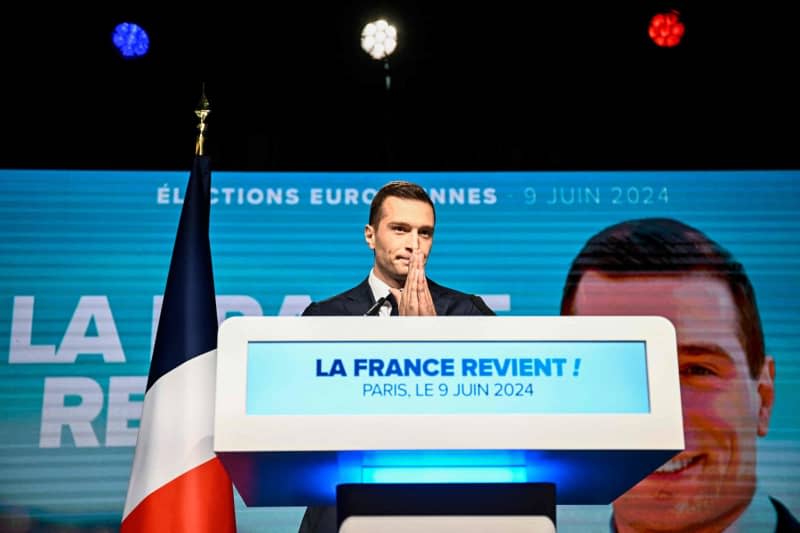Following its win in the European elections, France’s right-wing populist National Rally (RN) wants to woo other right-wingers, including from the far-right Reconquest party, for the snap parliamentary elections called by President Emmanuel Macron.
“I myself am perfectly willing to discuss with personalities who do not come from the National Rally and who share the ambition to bring some of our ideas to power in a few weeks and – also within the framework of a cohabitation – to initiate the reconstruction of the country,” RN party leader Jordan Bardella said on Monday evening in Paris.
In France, cohabitation means that the president and the prime minister represent different political directions.
Bardella had his first meeting on Monday with Reconquest’s lead candidate for the European elections, Marion Maréchal.
“I wanted to have a chat with her and talk about our current endeavours to form the broadest possible majority,” Bardella said, adding that his party wanted to run with other right-wing parties as a national union in the parliamentary elections with the aim of taking over the government and the office of prime minister.
No agreements have yet been reached with Maréchal, he said: “At the moment, it’s all about discussions.”
National Rally received 31.36% of the vote in the European elections, while Reconquest achieved 5.47%.
Maréchal is the niece of National Rally’s parliamentary party leader Marine Le Pen and used to be active in her party before switching to the far-right rival party a good two years ago.
“It seems obvious to me that the 1 million voters of Reconquest must participate in this momentum around the RN,” Maréchal said after an initial discussion with Bardella and her aunt.
National Rally would like “to work with those in Reconquest who have taken a constructive stance towards the RN.”
Reconquest leader Éric Zemmour, who is at loggerheads with National Rally, could be an obstacle to a right-wing alliance. French media are also speculating about a return of Maréchal to National Rally.
France goes into election campaign mode
France swiftly entered election campaign mode within 24 hours of the stunning electoral victory for National Rally.
President Emmanuel Macron dissolved the National Assembly, France’s lower house of parliament, on Sunday after the scope of the far-right victory became clear and and scheduled parliamentary elections in just a few weeks’ time.
Various parties are strategizing their campaigns in response to the sudden electoral call.
Macron’s job as president is not at stake in the upcoming elections, as the next presidential election is not scheduled until 2027.
Government under pressure for a long time
His aim is to create a more stable majority in parliament for his remaining term of office. He will be hoping that citizens in France will not vote the same way in national elections as they did in the European Parliament elections, and that the snap election will break Le Pen’s momentum.
While Macron enjoys a prominent role on the international stage, his governing camp has been struggling domestically for two years as his faction has not had an absolute majority in the National Assembly.
This has forced his camp to navigate a contentious and combative legislative environment, often resorting to heavy-handed tactics and bypassing votes in order to implement their plans.
The threat of a vote of no confidence this autumn has loomed over the government for some time, adding to the challenges of governing.
Consequences for Germany and Europe
Macron’s snap election call is a big gamble. If it fails, it could have serious repercussions for Germany and Europe. Observers say the French president could lose substantial influence, making it difficult for him to advance his foreign policy agenda.
France could descend into a chaotic domestic political situation, compromising its reliability as an international partner.
However, if Macron manages to secure a more stable majority, it would benefit international partners as he would no longer be preoccupied with quelling domestic political unrest.
This marks the first dissolution of the French National Assembly in over 25 years, a significant move in France’s recent political history.
EU vote results as catalyst for snap polls
National Rally secured 31.36% of the European vote, according to preliminary results announced by the Interior Ministry on Monday after all the votes had been counted.
Macron’s camp came a distant second with 14.6%, followed by the Socialists with 13.83%.
The eurosceptic National Rally – which used to be called the National Front until six years ago – has softened its image in recent years in an effort to widen its appeal and strengthen Le Pen’s bid for the presidency.


 Ferdja Ferdja.com delivers the latest news and relevant information across various domains including politics, economics, technology, culture, and more. Stay informed with our detailed articles and in-depth analyses.
Ferdja Ferdja.com delivers the latest news and relevant information across various domains including politics, economics, technology, culture, and more. Stay informed with our detailed articles and in-depth analyses.
